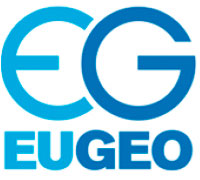is an association of geographical societies, associations and other institutes representative of geographers and geographical science in EU-nations. All of them work autonomously and represent a geographer community from a country or region. Although the founding members were basically the old Geographical societies, many of them with one hundred years of life, EUGEO is open to those geographical institutions wishing to work in promoting a shared idea of Europe.
The Società Geografica Italiana started the initiative and the idea was embodied at the meeting held in Rome in 1994, with the attendance of six representatives of other geographical societes from other countries. After drafting the statutes, the Board of Directors and the General Assambly met for the first time officially in Paris in 1996. Since 1997 EUGEO works as a scholarly society under the Belgian act of 1921. Ten were the societies that subscribed the first statutes, the Real Sociedad Geográfica among them, to which five more entities have adhered since then. Thus, previously to the extension of the European Union to 25 nations, all the EU nations except Luxembourg and Greece were represented in EUGEO, and Spain and Italy had two societies each. Nowadays societies from the new EU-nations are joining. The EUGEO network is opening to other national or regional geographical societies and institutes in countries that are already members, which undoubtably will increase EUGEO’s work capacity and scope inside and outside EU land.
Objectives:
Among the essential objectives that motivated EUGEO’s creation we can point out the following:
- To improve communication and exchange of ideas between member institutions from an European point of view.
- To act as a lobbying body for geography in Europe before EU institutions and authorities.
- To encourage a Pan-European approach to geographical research in any of its basic and applied aspects.
- To set new approaches to Geography teaching in the European Union promoting good practices at every teaching levels.
- To have Geography positioned within the centre of the European debate.
- To disseminate and share knowledge by means of publishing and conferences.
- To credit geographers professionally in their acting fields.
Activities:
Activities have focused in the dissemination and exchange of knowledge by means of publishing and conferences. The key publishing activities include the production of a text on Geography of Europe, in progress, and a volume of papers on the position of Geography in the member countries published as a special issue of journal Belgeo for the 30th International Geography Congress (Glasgow, 2004), reproduced on EUGEO’s www.eugeo.org.
Conferences have been held annually since 2000 at events organised by some of the member societies (Paris, 2000; 2001, Brussels; 2003, London and 2004 in Glasgow). For 2007 an ambitious European Geography Congress under the title A new Geographical View of Europe and its Problems is planned; it is to be organised by the Royal Dutch Geographical Society. It aims to be the start of a series of European Geography conferences held jointly with EUGEO and some member societies.
Founding members:
The Royal Geographical Societies of Belgium, Netherland, Spain and United Kingdom; the Geographical Societies of France, Germany, Ireland and Italy, and the Geographical Studies Centre of Lisbon.
Executive Board (Elected in London, 2003):
- President: Prof. Christian Vandermotten (Open Univeristy of Brussels)
- Vicepresidents: Prof. Armando Montanari (Universidad Gabriele d’Anunzio) y Prof. Jean-Robert Pitte (Université de Paris-Sorbonne)
- Treasurer: Dr. Hans de Weert (Universidad de Nimega)
- Secretary-General: Dr. Rita Gardner (Royal Geographical Society)
Social seat:
Open University of Brussels www.eugeo.org
Real Sociedad Geográfica’s representative:
RSG is represented in EUGEO by a member of its Board of Directors.The current representative is:
Prof. Dr. Manuel Valenzuela Rubio
Professor of Human Geography
Universidad Autónoma de Madrid
manuel.valenzuela@uam.es

